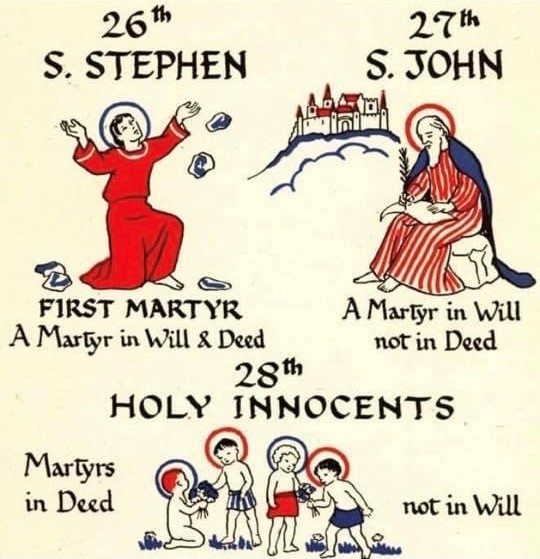Christmastide Feasts: St. Stephen, St. John, Holy Innocents (No Public Services)

Three major feasts fall on the days immediately after Christmas Day: St. Stephen on December 26, St. John on December 27, and the Holy Innocents on December 28. These three feasts are traditionally called the "Companions of Christ" (Comites Christi), serving as a kind of calendric honor guard for Christmas.
We will not hold any services in church on these days, but you're invited to remember these saints in your own prayers. The scripture readings and collects for each day can be found via the links below.
***
St. Stephen (readings and collect)
St. Stephen was the first Christian martyr. He was appointed as one of seven to serve the poor of the first Christian community in Jerusalem--traditionally thought of as the first seven deacons (Acts 6:1-6). His bold public preaching led him to be accused of blasphemy, tried, and stoned to death. Like Jesus at his own crucifixion, Stephen's last words were a prayer for the forgiveness of those who killed him. His martyrdom was witnessed by the young man Paul, who would later become a follower of Jesus and the greatest missionary of the first century. In many countries St. Stephen's Day is a day of gift-giving, visiting, mummers' dances, and the like. It is called Boxing Day in Great Britain, where "Christmas boxes" were often given as gifts on this second day of Christmas. The well-known Christmas carol "Good King Wenceslas" narrates the story of a kind monarch who helps a poor woodcutter "on the feast of Stephen."
***
St. John (readings and collect)
St. John was one of the Twelve, the brother of James and son of Zebedee. He is traditionally identified as "the disciple whom Jesus loved," an unnamed figure who figures prominently in the Gospel according to John, and as the author of both that gospel and the three Letters of John in the New Testament. Tradition is mixed as to the book of Revelation, whose author was also named John, but was likely a different figure. The gospel and letters of John emphasize Jesus' eternal nature as the incarnate Word of God. They also emphasize the importance of love: love for God, love for one another. "God is love, and those who abide in love abide in God, and God abides in them" (1 John 4:16). One tradition for St. John's Day is to drink mulled wine (or another drink) with the toast, "I drink to you with the love of St. John."
***
Holy Innocents (readings and collect)
This day commemorates the children slain by King Herod in his search for the infant Jesus (Matthew 2:16-18). This tragic act of brutality is mourned in the haunting and beautiful Coventry Carol: "That woe is me, poor child, for thee." The three saints' days immediately following Christmas are sometimes said to commemorate three kinds of martyrdom. St. Stephen (Dec. 26) was a martyr in both will and deed. St. John (Dec. 27) willingly risked his life for the gospel, but was not in fact killed for it, and is said to have been a martyr in will though not in deed. The Holy Innocents were martyred without any conscious agency of their own, and are said to have been martyrs in deed though not in will. Occurring in the midst of the joyous Christmas season, the Feast of the Holy Innocents reminds us that the Incarnation of Jesus takes place in a hurting world. It is a fitting day to remember and pray for all victims of injustice, disaster, and tragedy.
Image: My Book of the Church Year, Enid Chadwick
Tags: News & Notes / Worship Services